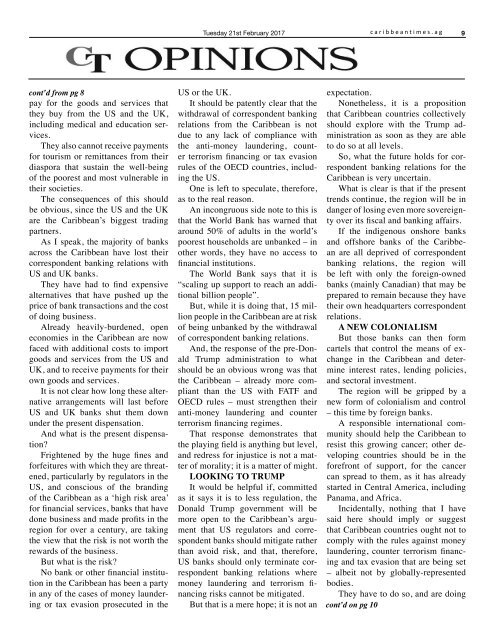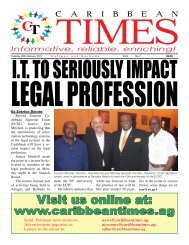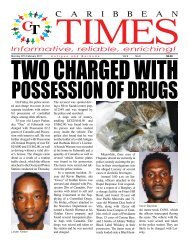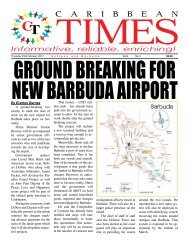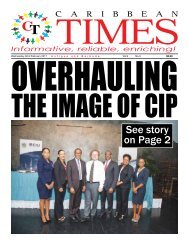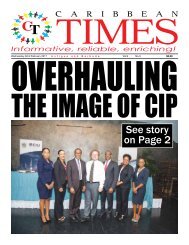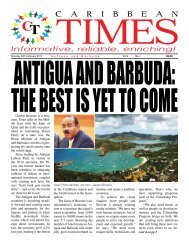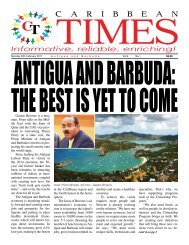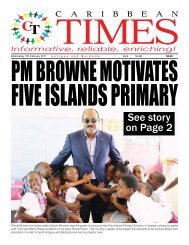Caribbean Times 2nd Issue - Tuesday 21st February 2017
Caribbean Times 2nd Issue - Tuesday 21st February 2017
Caribbean Times 2nd Issue - Tuesday 21st February 2017
Create successful ePaper yourself
Turn your PDF publications into a flip-book with our unique Google optimized e-Paper software.
<strong>Tuesday</strong> <strong>21st</strong> <strong>February</strong> <strong>2017</strong> c a r i b b e a n t i m e s . a g 9<br />
cont’d from pg 8<br />
pay for the goods and services that<br />
they buy from the US and the UK,<br />
including medical and education services.<br />
They also cannot receive payments<br />
for tourism or remittances from their<br />
diaspora that sustain the well-being<br />
of the poorest and most vulnerable in<br />
their societies.<br />
The consequences of this should<br />
be obvious, since the US and the UK<br />
are the <strong>Caribbean</strong>’s biggest trading<br />
partners.<br />
As I speak, the majority of banks<br />
across the <strong>Caribbean</strong> have lost their<br />
correspondent banking relations with<br />
US and UK banks.<br />
They have had to find expensive<br />
alternatives that have pushed up the<br />
price of bank transactions and the cost<br />
of doing business.<br />
Already heavily-burdened, open<br />
economies in the <strong>Caribbean</strong> are now<br />
faced with additional costs to import<br />
goods and services from the US and<br />
UK, and to receive payments for their<br />
own goods and services.<br />
It is not clear how long these alternative<br />
arrangements will last before<br />
US and UK banks shut them down<br />
under the present dispensation.<br />
And what is the present dispensation?<br />
Frightened by the huge fines and<br />
forfeitures with which they are threatened,<br />
particularly by regulators in the<br />
US, and conscious of the branding<br />
of the <strong>Caribbean</strong> as a ‘high risk area’<br />
for financial services, banks that have<br />
done business and made profits in the<br />
region for over a century, are taking<br />
the view that the risk is not worth the<br />
rewards of the business.<br />
But what is the risk?<br />
No bank or other financial institution<br />
in the <strong>Caribbean</strong> has been a party<br />
in any of the cases of money laundering<br />
or tax evasion prosecuted in the<br />
US or the UK.<br />
It should be patently clear that the<br />
withdrawal of correspondent banking<br />
relations from the <strong>Caribbean</strong> is not<br />
due to any lack of compliance with<br />
the anti-money laundering, counter<br />
terrorism financing or tax evasion<br />
rules of the OECD countries, including<br />
the US.<br />
One is left to speculate, therefore,<br />
as to the real reason.<br />
An incongruous side note to this is<br />
that the World Bank has warned that<br />
around 50% of adults in the world’s<br />
poorest households are unbanked – in<br />
other words, they have no access to<br />
financial institutions.<br />
The World Bank says that it is<br />
“scaling up support to reach an additional<br />
billion people”.<br />
But, while it is doing that, 15 million<br />
people in the <strong>Caribbean</strong> are at risk<br />
of being unbanked by the withdrawal<br />
of correspondent banking relations.<br />
And, the response of the pre-Donald<br />
Trump administration to what<br />
should be an obvious wrong was that<br />
the <strong>Caribbean</strong> – already more compliant<br />
than the US with FATF and<br />
OECD rules – must strengthen their<br />
anti-money laundering and counter<br />
terrorism financing regimes.<br />
That response demonstrates that<br />
the playing field is anything but level,<br />
and redress for injustice is not a matter<br />
of morality; it is a matter of might.<br />
LOOKING TO TRUMP<br />
It would be helpful if, committed<br />
as it says it is to less regulation, the<br />
Donald Trump government will be<br />
more open to the <strong>Caribbean</strong>’s argument<br />
that US regulators and correspondent<br />
banks should mitigate rather<br />
than avoid risk, and that, therefore,<br />
US banks should only terminate correspondent<br />
banking relations where<br />
money laundering and terrorism financing<br />
risks cannot be mitigated.<br />
But that is a mere hope; it is not an<br />
expectation.<br />
Nonetheless, it is a proposition<br />
that <strong>Caribbean</strong> countries collectively<br />
should explore with the Trump administration<br />
as soon as they are able<br />
to do so at all levels.<br />
So, what the future holds for correspondent<br />
banking relations for the<br />
<strong>Caribbean</strong> is very uncertain.<br />
What is clear is that if the present<br />
trends continue, the region will be in<br />
danger of losing even more sovereignty<br />
over its fiscal and banking affairs.<br />
If the indigenous onshore banks<br />
and offshore banks of the <strong>Caribbean</strong><br />
are all deprived of correspondent<br />
banking relations, the region will<br />
be left with only the foreign-owned<br />
banks (mainly Canadian) that may be<br />
prepared to remain because they have<br />
their own headquarters correspondent<br />
relations.<br />
A NEW COLONIALISM<br />
But those banks can then form<br />
cartels that control the means of exchange<br />
in the <strong>Caribbean</strong> and determine<br />
interest rates, lending policies,<br />
and sectoral investment.<br />
The region will be gripped by a<br />
new form of colonialism and control<br />
– this time by foreign banks.<br />
A responsible international community<br />
should help the <strong>Caribbean</strong> to<br />
resist this growing cancer; other developing<br />
countries should be in the<br />
forefront of support, for the cancer<br />
can spread to them, as it has already<br />
started in Central America, including<br />
Panama, and Africa.<br />
Incidentally, nothing that I have<br />
said here should imply or suggest<br />
that <strong>Caribbean</strong> countries ought not to<br />
comply with the rules against money<br />
laundering, counter terrorism financing<br />
and tax evasion that are being set<br />
– albeit not by globally-represented<br />
bodies.<br />
They have to do so, and are doing<br />
cont’d on pg 10


